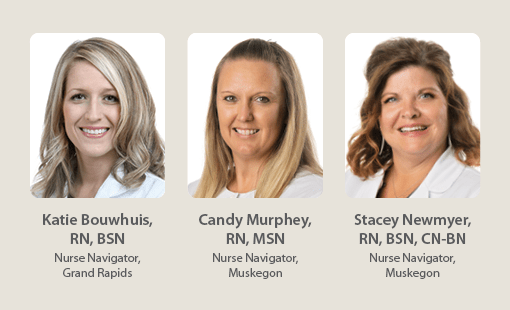Your Experienced Guide on a Journey Like No Other
October 12, 2021
By: Mary Ann Boyer
Categories: Cancer
Let’shope you never have to meet Candy Murphey, RN.
That goes for Katie Bouwhuis, RN, and Stacey Newmyer, RN, too.
But if you do have to meet them, you couldn’t be in better hands.
You would be one of more than 3.8 million women in the U.S.* who are receiving or have completed breast cancer treatment — and these experienced nurses would be your guides on that journey.
They are Nurse Navigators at Mercy Health’s Comprehensive Breast Centers (Muskegon and Grand Rapids). Murphey and Newmyer work at the center in Norton Shores and Bouwhuis is located at the center in Mercy Health Lacks Cancer Center in Grand Rapids. Mercy Health is a member of the collaborative with University of Michigan Health West, known as the Cancer Network of West Michigan.
Murphey has worked at Mercy Health since 2004 in various nursing capacities, such as Med Surg, OR, and Labor and Delivery. As a nurse navigator for the past two years, she estimates she has helped at least 200 patients from the time of diagnosis through treatment, and on to survivorship.
What she enjoys most about being a nurse navigator is the way it combines teaching and compassionate care during a very difficult time.
“I educate patients about the disease process and am also able to be that compassionate support person they may need. I treat patients as if they are my family,” said Murphey.
Like a Concierge Service for Breast Cancer Patients
The role of nurse navigator is both complex and personal: part RN, part social worker, part administrative assistant, and part emotional support person. It is almost like being a concierge service for each breast cancer patient.
It all starts with notifying the patient of the diagnosis, which the nurse navigator does in person or, more recently, by phone. During the pandemic, patients have been more open to finding out the results of scans or biopsies by phone. The nurse navigator is introduced to the patient during the biopsy so when she makes that call with the results, the patient has already met her.
Nurse navigators are aware of each patient’s case because they are members of the Tumor Board, which consists of doctors and other health care providers with different specialties who meet regularly to discuss cancer cases and share knowledge. Their goal is to come up with the best treatment plan possible by looking at each person’s case individually.
Murphey likes to review results with the patient and a support person because there is often a lot to take in at once and try to remember. She educates the patient about the type of breast cancer she** has, and the treatment plan based on her specific circumstances. And of course, she answers questions any time the patient has concerns.
If the patient wants help with referrals for treatment — whether for surgery, chemotherapy, or radiation — the navigator is there to make referrals and appointments with members of the breast cancer teams in West Michigan.
“We have a phenomenal breast care team at Mercy Health — both in Muskegon and Grand Rapids. We work together. Having the ability to work in a team to develop the best care for a patient is why I went into nursing and what I always wanted to do,” said Murphey.
Keeping Track of It All
Treatment plans often involve initial and follow-up appointments with various specialists that can be challenging to keep track of. Nurse navigators monitor and assist with scheduling everything from diagnostic scans to genetic testing along with surgery, radiation, and even plastic surgery consultations.
Sometimes patients have questions about insurance or need help accessing community resources. “Patients often start by asking us, and we do our best to get them in touch with the person best able to answer their questions,” she said. “It is a bit like being a social worker.”
With so many details to handle over months of treatment, Murphey is in awe of patients who traveled this road prior to having nurse navigators.
“We often ask ourselves, ‘If we didn’t do this, how would patients be able to do it? Would patient care be falling through the holes?’”
Murphey’s Best Advice
Education is a very important aspect of what she does. One day each school year, Fruitport High School health educators invite nurse navigators to speak to teenaged girls in their classes.
“I stress to them, “Learn what your breasts feel like now. For you, it may be normal to have lumps and bumps. If you continue to do your monthly exams and something abnormal comes up, the goal is that you’ll recognize it because you know what’s normal for you.”
Early detection is key.
“My advice for readers is to remember this: The earlier breast cancer is diagnosed, the more treatable and curable it can be. So, get your mammograms and do your monthly self-exams.”
*Source: cancer.org
**Men can have breast cancer too.





